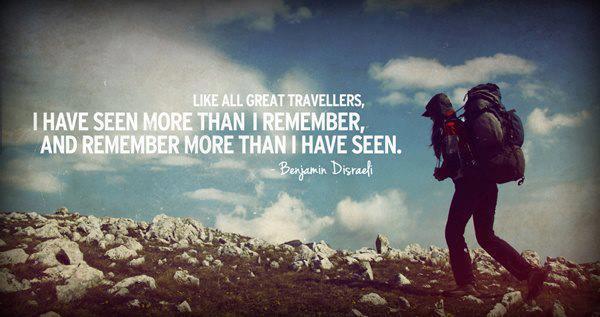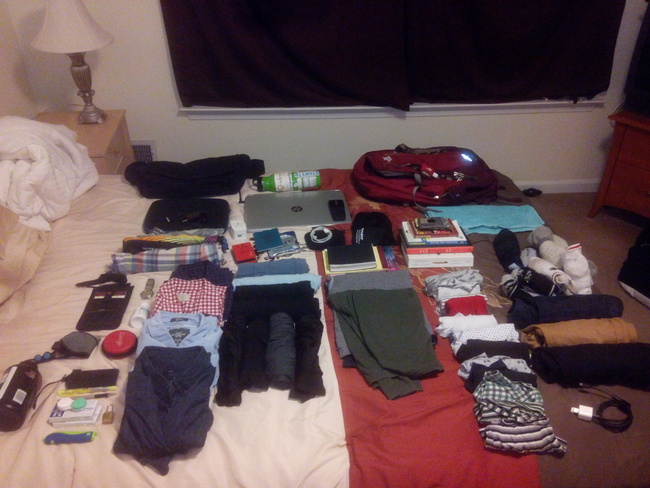What’s in Your Backpack?
“How much does your life weigh? Imagine for a second that you’re carrying a backpack… with all the stuff that you have in your life. You feel the straps cutting into your shoulders?”
Ryan Bingham, the quote’s author, is an advocate of the empty backpack. He’s a successful business man, a frequent global traveler, speaker – and something of a self-proclaimed shark. He’s also not real: he’s the main character of the powerful movie Up In The Air.
I learned thousands of years of Chinese history and hundreds of simplified Chinese characters before my trip, but the first time I was leaving for the opposite side of the world, I knew very little of light backpacks. I packed two huge suitcases filled with more clothes than I would wear, products I would consume, or books I would read. 6 weeks after arriving I was repacking my bags to leave, and noticing shirts I had never even unrolled.
Protip 1: Rolling your fabrics saves space.
Protip 2: Not taking crap you won’t use saves even more.
My second trip to Asia would be for a year, but I had learned my lesson. I packed clothes right for the range of climates I would explore, digitized everything I could to eliminate books from my luggage, and avoided bringing anything consumable. The result: two medium bags, and gunning to go.
I hadn’t really learned much after all. By my return in August 2013, I had a carry on and a backpack to my name and was set for indefinite travel.
Travel didn’t force me cut down on my items – it forced me to reassess my needs, and examine their costs.
The things we own can definitely bring us value. It saved me recurring payments at cyber cafes to type this on my own laptop, the time it would take to make a visit to use a library computer, and brought me joy to know I had a powerhouse machine at my fingertips when I first bought it. Money, time, and happiness – must be living the dream!
But this thing has costs far beyond its price. For one, it’s really damn heavy. I own it, I use it regularly, and so I have to carry the burden – both on body and mind. Worse yet, if it’s not doing much for me, who else might find the same joy from it I once did?
The objects that bring us value come at a cost beyond their price.
We are literally weighed down by our hoards and empires. We become unable to travel easily. We suffer messes in our homes and offices. We lug redundant gadgets with us just in case. We justify our overflowing closets because we dress to impress – when it’s really not the clothes that make the man or woman, but vice versa. Is that sixth hoodie worth the five pounds & space in your backpack?
Our minds are equally burdened. We amass things for the “what ifs,” “maybe whens,” and one-time projects. Unused tools, unread books, and unworn clothes don’t just add pounds to our bag. They remind us daily of their existence, nagging us to use them, read them, wear them. At worst, they instill in us a feeling of inadequacy. “I can’t believe I haven’t gotten around to reading The Aneid yet!” Is that book you’ve let sit for months worth its equivalent weight on your mind?
The world beyond America isn’t the only place unused to our common excesses – even our own neighborhoods have great need. The final trigger for me to purge my closet of 90 pounds of clothes this Christmas came from the weight of conscience. Considering marginal utility, another power tool in your garage is worth a fraction of what it’d mean to a handyman, a neighbor, or even a struggling artist doing freelance maintenance work. And hey, it’ll feel good to give. Science. Could you be happier in getting rid of some things than in keeping them?
Think about your garage, your bathroom cabinet, or your closet. Have you used everything there in the last six months? What about last year or two? If not, does knowing you own that diamond-edge rotary saw, miracle crow’s feet cream, or set of leopard pumps make you happy – or does accruing more stuff begin seeming like a force of habit?
What I learned on the other side of the world
Travel first taught me that things must be assessed by their value as well as their cost: not only of price, but weight, mental space, and in their absence with someone who might better use them. The things I carried still mattered to me, but I needed fewer of them.
The true mental shift of travel came not from the time at airports, but from time having experiences. In Asia, I bought plane tickets that cost less than a tank of American gas that took me to a different country. The adventures I had, people I met, and memories never caught on camera aren’t just beyond explanation to current college peers, they’re beyond outward expression.
I came to appreciate just how small the world is and how easy it is to create the types of experiences we’ve always wanted to have. An around the world ticket? They can clock in at $4,000 by rough estimate. A dream like that is already in reach, and compared to items I might buy with that amount, few things can match up. Travel taught me a more important thing about possessions: they can never match up to the joy of experiences.
Money is less important to me than how I can spend it, with whom, with what degree of global mobility, and with what degree of free time. A wise saying goes, we don’t want to all be millionaires – we just want to live like them. It just so happens my favorite region of the world has a much lower cost of entry for the experience, and I want to maximize these adventures before my body is old and weary.
Taking my own medicine
The above is all I own, and will be adequate for indefinite travel once I pick up a windproof/waterproof jacker. Realizing what’s important makes it much easier to get rid of the things that aren’t. Priority one: minimize. Everything. First, my possessions. Anything that is not regularly necessary makes me less effective, and will be better off in a new home. Many things I’m selling to pay down my some luckily light student loans. Some I am giving away in exchange for a personal challenge: a guitar can be yours in exchange for a song, but only if it truly pushes your comfort zone. All that remains will be given away in a way that will maximize the good I can do.
90 pounds of clothes & gadgets have already been liquidated & recycled.
How?
- Step 1: I hosted a going away party in Boston. We cooked all our remaining food, drunk all our remaining wine — and also sold/gifted some of my “best” possessions to close friends. Great mementos, useful things, and high return on investment.
- Step 2: Remaining upper-to-middle quality clothes were cosigned at cash-up-front consignment/reseller shops Buffalo Exchange & Crossroads Trading Co. in New York City and Boston. Returns are 30% and 35% up front, respectively. Buffalo Exchange tends to accept broader styles.
- Step 3: Professional & durable clothes clothes and shoes were donated to Dress Outs, which provides rehabilitated parolees with apparel to become employment-ready after release. This was done directly through a relationship with Buffalo Exchange in New York City.
- Step 4: Remaining men’s clothes not fit for the program were donated to a local men’s homeless shelter in lower New York.
- Step 5: Finally, loose ends and random gadgets of value too good for a recycling plant were donated to a New Jersey Goodwill.
Or, keep it simple: schedule a pickup.
Getting these things together took a single day. Getting rid of them took half of another – not counting the party. I made almost $500 and donated the majority of goods to causes where they will be better used. I feel lighter, more optimized to do both well and good.
Ryan makes two more points. To move is human – and with how little I now own by comparison, I can’t wait to get on the road.
The other thing? To be an effective human is to be a shark, to hunt alone. There, I couldn’t disagree more. With newfound mobility and more space in my bag, I’ve got plenty of room for some great new people. Here’s to winter in California.

